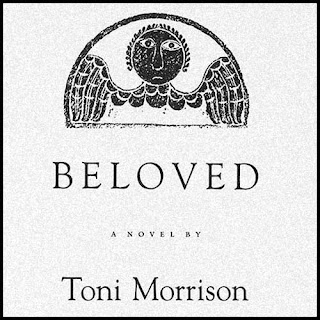For this section of my blog, I will be responding to questions we discussed in the unit regarding the classic Pulitzer prize winning Toni Morrison novel, Beloved, using some of my own mother's words as insight into some of my reflections, Toni Morrison's own words on the subject of motherhood, and discuss motherhood in the context of the horrible conditions of slavery and some of the big moral questions this novel poses.
Firstly, I want to express how excited I was to read this novel, as I am very familiar with Morrison's work and I had never gotten around to reading this particular title. It lived up to all my expectations then exceeded them. The prose is lyrical and dense, adding up to a heartbreaking and powerful novel that is essentially about what it is like to be a mother, particularly grappling with what is it to be a mother against the backdrop of the horrific institution of slavery. One of the many horrors that slavery caused was an impossibility for mothers to actually mother their children. Who knows when this child could be shipped off or sold to another plantation? How can I swaddle and nurse my child when have painstaking labor to finish or i'll get beaten? How can I allow myself to care about this child I created when I do not have ownership over it or myself? There is every possibility that my child will get raped or beaten by a slave owner in its life. How can I let myself feel for something that is going to experience a life full of pain? These are some of the questions the novel's protagonist Sethe has to grapple with and what eventually leads her to commit infanticide against her third child. In the context of being a mother, how do we judge Sethe's actions?
Before arriving conclusively to an opinion on this act I analyzed the reaction of the other characters in the novel, imagined the unknowable horrors of not having ownership of your own body (an idea that is nearly unbearable), and imagined the worry a mother would feel for her children knowing they would soon know this horror. The other characters in the novel who were slaves themselves are not shy about casting judgement at Sethe, with most of the community avoiding 124 at all costs. Paul D, a slave that worked alongside Sethe at Sweet Home, offers his opinion on how the concept of love should be treated in a slave's life when he witnesses Sethe's affection for Denver and Beloved commenting, “Risky, thought Paul D, very risky. For a used-to-be-slave woman to love anything that much was dangerous, especially if it was her children she had settled on to love. The best thing, he knew, was to love just a little bit, so when they broke its back, or shoved it in a croaker sack, well, maybe you'd have a little love left over for the next one.” This is a less a judgment of the act and more so a judgment of letting yourself getting to a point where you would have to commit such an act out of love. Baby Suggs, the murdered child's grandmother, is seemingly the only character in the novel who understands Sethe's decision, though she remains quiet on the subject. As a mother who has lost eight or nine children herself, she seems to quietly understand why Sethe did what she did.
I spoke to my own mother about Toni Morrison's Beloved and told her of Sethe's actions the novel revolves around and I asked for her opinion on what Sethe did and if she would do that to/for me. Of course my mother and I, two white individuals, could never know the true horrors of slavery, but we often have hypothetical discussions that include a lot of "what-ifs". My mother looked contemplatively as she thought about it for a moment and then finally said she would be unable to do that to me (kill me in order to protect me from a worse fate). For me, my mother saying this, made Sethe's action seem all the more admirable. My mother, who i'd say I have a fairly good relationship with, would not be able to actually commit the one act (however grisly) that would save her child from a lifelong nightmare, but Sethe's motherlove (perhaps the main theme of Morrison's Beloved) is so endless, even though she has faced so much hate, that she selflessly ends her baby's life so that she does not have to face the horrors Sethe's life has seen. To me, Sethe's actions are justifiable and not worthy of admonishment, and come from an unknowable amount of love after a life that has seen an unknowable amount of pain. Sethe is a shining example of what a mother is, no matter the historical backdrop, but she is particularly impressive as a mother while slavery was still rampant. She loves her children selflessly and will do even the most painful things in order to protect them.

No comments:
Post a Comment